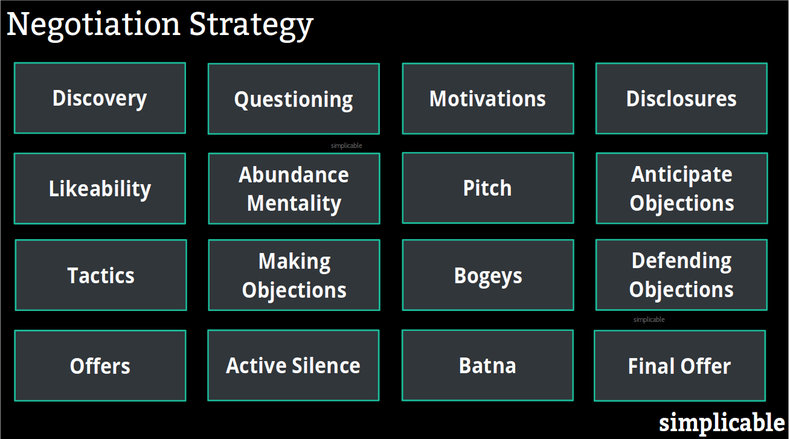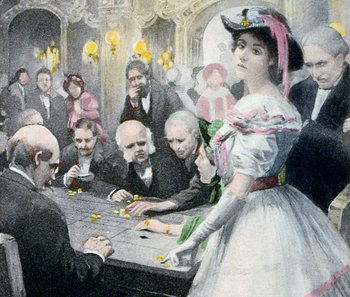

Discovery
Research everything that you can about the other side and their negotiating position before walking into negotiations. Communicate to discover the strength of the other side's position. For example, a purchasing manager who tries to detect how badly a salesperson needs to close a sale.Questioning
Use questioning to discover the other side's position. For example, an employee who asks how long a position has been unfilled. A position that has just been created may indicate urgent need.Motivations
Listening carefully to understand motivations. For example, an employer who listens carefully to a job candidate to try to understand what they really want as opposed to what they say they want.Disclosures
Try to avoid disclosing any information that indicates a weak position. For example, a job candidate with no other job offers might be vague and just say they are talking to other firms.Likeability
Negotiation can feel somewhat adversarial but it is important to maintain a friendly composure. It often helps to view negotiations with a sense of humor. Avoid negative emotions such as anger, conceit and mistrust. Generally speaking, you are more likely to walk away with a good deal if the other side likes you.Abundance Mentality
Abundance mentality is the practice of looking at situations as win-win. Think of things from the other side's perspective and try to find offers that benefit both sides.Pitch
Pitch the value you are offering. For example, a real estate agent who pitches "this is a unique property so close to the university and the waterfront, I can tell you that properties like this don't often come on the market."Anticipating Objections
The other side might point out the weaknesses of your position. Anticipate this ahead of time and plan your answers. For example, if you are selling a house that has been on the market for an unusually long time be prepared to answer why this is the case.Tactics
Familiarize yourself with negotiation tactics to be able to identify and counter common tricks and techniques. For example, don't allow the other side to make unjustified assumptions such as "so you're willing to accept a lower salary because you want to work from home."Making Objections
Identify things early and often that are obstacles to a deal. For example, if you are buying a home point out that it is far from schools or that its bedrooms are small. If you are a job candidate, part of your value is your enthusiasm for the position and it can be a bad idea to aggressively state objections.Bogeys
A bogey is a common negotiating strategy that involves generating a demand that isn't actually important to you so that you can later give this up and make the other side feel that they won. It is common to chose something you know the other side can't give you so that you don't accidentally win the bogey. For example, a customer purchasing a vehicle pretends they want an expensive upgrade for free. They focus on pushing for the upgrade, knowing the salesperson can't grant it. This may cause the sales person to push down the price to get you to drop the bogey.Defending Objections
Don't allow anything to be taken off the table. Keep everything in play until an offer is made. For example, an employer who says "you can start next week right?" may be trying to eliminate this as a point of negotiation. An employer who has an immediate need may be willing to offer a higher salary or signing bonus if you are willing to start right away. The more objections you are able to maintain, the more pressure you put on the other side to give you things.Offers
Push the other side to make an offer. If you are the first to make an offer make it unreasonable. Avoid stating what you really want as a first offer as the other side will want to bring you down.Active Silence
Be comfortable in silence and use silence to force the other side to make the next move. For example, silence can be used to get the other side to make an offer.Batna
Batna is what you will do if you fail to reach an agreement. Understanding your batna and the batna of the other side is an important element of negotiation. For example, if you know with certainty that you can get a salary of over 100k you will have confidence to reject offers under that amount. However, if you badly need a job you may have to accept any reasonable offer. Skilled negotiators will always seek to understand the other side's batna. They will also try to overstate their batna to the other side.Final Offer
Push the other side to make better offers until you are convinced they have made their final offer. If the offer is better than your batna, generally you can accept it at this point. If the offer is below your batna you need to be the one to make a final offer. If the other side rejects your final offer, ask them to think about it and indicate a deadline. A final offer indicates you are willing to go without a deal if the other side rejects the offer.| Overview: Negotiation | ||
Type | ||
Definition | A plan or approach to negotiation. | |
Related Concepts | ||




































